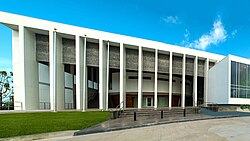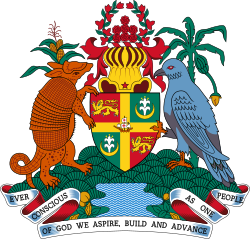This article needs additional citations for verification .(December 2009) |
House of Representatives | |
|---|---|
| 11th Parliament | |
 | |
| Type | |
| Type | of the Parliament of Grenada |
| History | |
| Founded | 1967 |
| Leadership | |
Leo Cato since 31 August 2022 | |
Dickon Mitchell,NDC since 24 June 2022 | |
Emmalin Pierre,NNP since 21 February 2025 | |
| Structure | |
| Seats | 16 |
 | |
Political groups | His Majesty's Government (10)
Other opposition (1)
Presiding Officer
|
| Elections | |
| First-past-the-post | |
First election | February 1925 (as Legislative Council) |
Last election | 23 June 2022 |
Next election | On or before 31 August 2027 |
| Meeting place | |
 | |
| New Houses of Parliament Parliament Hill - Mt. Wheldale St. George's Grenada | |
| Website | |
| grenadaparliament | |
 |
|---|
| Administrative divisions (parishes) |
The House of Representatives of Grenada is the lower chamber of the country's bicameral parliament. Together with the upper chamber, the Senate, it meets in the New Houses of Parliament in the capital St. George's.
Contents
- Roles
- Relationship with the government
- Legislative functions
- History
- Meeting place
- Members of the House of Representatives
- 2022 to present
- See also
- References
The House of Representatives has a total of 16 members. 15 are directly elected to five-year terms from single member constituencies using the first-past-the-post system. Final seat is held by the Speaker of the House, who is not an elected member, but sits ex officio following their election to the post by the 15 elected members.